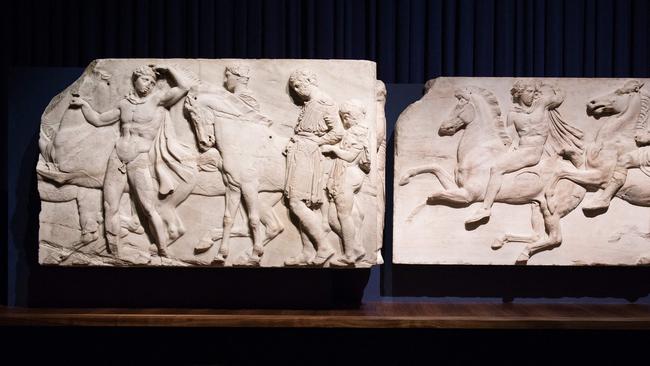Vatican signs agreement to return Parthenon marbles to Greece
The move could put pressure on the UK and other countries to return pieces of the Acropolis monument.

The Vatican has signed an agreement to return to Greece three sculpture fragments from the Parthenon that have been part of the Vatican Museums’ permanent collection for 200 years, a move that could put pressure on the UK and other countries to return works of art to Athens.
The official signing on Tuesday for the three 2500-year-old fragments — which represent the heads of a boy, a man and a horse — took place at the Vatican and came after a first announcement of the accord in December. The fragments are due to be officially handed over to Greek officials in a ceremony in the capital Athens on March 24, the Vatican said.
Greece has had some success in recent years in getting back pieces of the Parthenon that through the centuries ended up in museums scattered across Europe. Last year, an archaeological museum in Palermo, Italy, made a long-term loan to Greece of a piece of the Parthenon from its collection.
The collection at the British Museum, which has been on display since the 19th century and is one of the institution’s most famous exhibits, is most often cited for housing parts of the Parthenon, but there are also pieces of the ancient Greek temple at the Louvre in Paris, the Kunsthistorisches Museum in Vienna and in others.
The Greek government has been campaigning for years to have the marbles from the Parthenon’s frieze returned. British Museum chairman George Osborne, a former chancellor of the exchequer, and Greek officials have held periodic discussions for more than a year. The British Museum has so far baulked at the idea that the marbles should be returned to Greece forever. The British Museum has said publicly that it is seeking a new “partnership” with Greece, but the Greeks have insisted that the marbles be returned outright, arguing they were stolen. Lord Elgin had the marbles removed from the Parthenon and sent to London in the 19th century.
In December and again on Tuesday, the Vatican referred to its move as a religiously inspired donation. The Holy See said the move grew out of the pope’s 2021 meeting in Athens with the archbishop of the Greek Orthodox Church.
The pope wants the donation to be seen “as a concrete sign of the sincere desire to continue on the ecumenical journey of witness to the truth,” the Vatican said on Tuesday. “This initiative … is of great historical importance and will have multiple and positive repercussions,” said the Emmanouil Papamikroulis, who was at the Vatican signing ceremony representing the Greek Orthodox Church. “There is still so much to do, to restore the wounds and traumas that have brought on (the Parthenon), practices that belong and date back to a distant past.”
The Wall Street Journal


